Linguists have known for decades that female adolescents are a major source of language interference. (Getty Images: The Good Brigade)
When Alison McPhee-Harris has dinner with her family, sometimes things can get misinterpreted.
The Gold Coast mother said she sometimes struggled to understand what her daughters, aged 17 and 19, were saying and she would always ask, “Is that a word?”
Alison’s young daughter feels the same way.
Listen to the podcast
Photos show Future Tense tiles.

Future Tense explores new ideas and technologies.
“My sister would know exactly what I was talking about, but my mom and dad had no idea,” she said.
Alison isn’t the only one feeling out of touch. Linguists have found that when it comes to language, teenage girls are pioneers.
“If you’re on .. a train or a bus, what you should do is get as close as you can to a group of young women and close your eyes and listen. What you’re hearing .. is the future of the language in your community,” University of Toronto linguistics professor Sally Tagliamonte told ABC RN’s Future Tense.
While young people tend to be ahead in language, Dr. Tagliamonte noted that young women tend to be at least a generation ahead of young men.
She said: “Young women are often the drivers and accelerators of language change and progress.
What’s the evidence?
Dr. Tagliamonte’s research involved speech samples from men and women ranging in age from pre-adolescents to eighty years old.
Dr Tagliamonte said that based on these conversational speech samples and statistical models, she could quantify how the language of different populations has changed over time.
“We can show how one group is different from another and whether that difference is statistically significant,” she said.
“It was these teenage women who .. drove the language change.”
The finding that young women are driving language change is not new.
Stream your favourite shows on the free ABC listen app
Photo shows an image of Dr. Karl and the Listen app logo on a pink background

Dr. Karl knows the best free podcast, radio, music, news, and audiobook apps… and you don’t have to be a scientist to find it!
More than two decades ago, William Labov, the founder of modern sociolinguistics, pointed out that women are responsible for 90% of language change.
Then in 2003, linguists examined 6,000 letters written between 1417 and 1681.
The study found that new language was absorbed faster in letters written by women than in letters written by men.
Dr Tagliamonte said: “When we look at contemporary language change, we see the same types of patterns in language use.
Still, Dr. Tagliamonte points out that “the changes that the young women are promoting may have been in the language for a long time”.
Slang often originates from marginalized groups, such as the queer community or POC (people of color).
Dr Tagliamonte’s research shows that language is changing and evolving faster than ever before, thanks to social media.
“Before breakfast, most teenagers have come into contact with someone from another country, another city, or even an entire town,” she said.
“What this means is that .. there is more contact now than ever before, which is causing language change to accelerate.”
Why specifically young women?
Teens are inherently connected, regardless of gender. So why are women the agents of language change?
More stories from Future Tense
- The Insidious Nature of Algorithmic Feeds
- If aliens came, could we communicate with them? These experts say yes
- The researcher analyzed 12 ways cities can reduce traffic congestion. Congestion taxes work best
-
‘Understanding the consequences’: How can we improve economic sanctions?
Biology is a major factor, Dr. Tagliamonte explains.
She said: “Women seem to be born with superior language skills than men.
Additionally, there are cultural factors at play.
“It appears that women use language as social and symbolic capital,” she said.
“If they don’t have the same economic power as men, they use language as linguistic capital, which is part of the reason we see gender differences between men and women.”
But not all change is celebrated
While some may celebrate the language change, others see it as threatening.
“Language change is a complex adaptive system. Change is not the same across generations because each generation has its own unique characteristics,” Dr Tagliamonte said.
As she explained, teens don’t want to sound like their parents, and vice versa.
What frustrates mom Alison the most is the Americanization of phrases her teenage daughters use.
for example, they mention “birth control” instead of “contraception,” “sweat” instead of “jumper,” and “gas” instead of “petrol.
She said: “I know it’s irrational, but I really find it annoying.
Dr Tagliamonte said that when we impose social value judgements on language it is not because the language is inherently good or bad.
“This is because we make judgments about others based on the way they speak.”
Yet it seems inevitable that language will continue to evolve.
“Is that even a word?”
Allison’s daughters are big fans of TikTok and reality TV, and their mother said they are constantly absorbing and incorporating elements of the culture.
Notably, many of these references come from marginalized groups whose cultural products have entered the mainstream; examples include the hugely popular RuPaul’s Drag Race and Beyoncé’s hit album Cowboy Carter, both of which center on African-American culture.
While these things change so quickly, here are some key phrases to note for those who are confused:
phrases with “in
- Bet — “I agree.” For example, if someone invites you out for dinner, you would say “bet’
- You devoured/ate it – used in response to a successful person
- Go all out – don’t care, just achieve your goal
- Slaps — If something sounds delicious, it must be delicious (usually referring to food)
- Ceebs – CBF variant [cannot be manipulated]
- Nausea – a sudden feeling of nausea, usually in response to someone’s behavior or conduct
The phrase “out
- No cap – Fact
- Lit — Some stuff is great, but is now considered very “2017-2018”
- Fam——used to refer to friends
- Slay — used to describe someone who is doing well but is considered outdated. You would only use this word to be sarcastic
RN in your inbox
Get more stories beyond the news cycle with our weekly newsletter.
Your information will be processed in accordance with the ABC Privacy Collection Statement.





